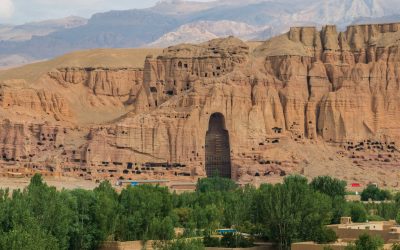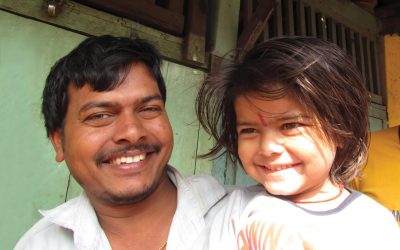Coventry – the city of peace and reconciliation. A city which experienced pain and suffering 78 years ago when it endured a relentless bombing campaign during the Second World War.
Father Forgive
More than 500 people died on that fateful night in November 1940, as the city lay smouldering in ruins the following morning.
At Coventry’s historic cathedral, only the outer shell of the walls and the tower remained standing.
But in the days that followed, two enduring symbols emerged from the rubble: two charred roof beams which had fallen into the shape of a cross were bound and placed at the site of the ruined altar; and three medieval roof nails were collected from the floor and, using wire, these too were bound into a cross.
This was the original Cross of Nails.
As the Rev Canon Dr Sarah Hills told this story and showed black and white film of the bombings, together with harrowing images of the mass graves of the victims, there was a numbed silence at the Presidential Peacebuilding Conference taking place just five miles down the road at Coventry’s Ricoh Arena.
But out of the rubble came sorrow, hope and love, explained Rev Hills, the Canon for Reconciliation at Coventry Cathedral.
Our aim is to heal the wounds of history, celebrate diversity and build a culture of peace”
“The following morning, Provost Dick Howard, the leader of the cathedral community, declared ‘Father forgive’, which was not a popular message for many people in Coventry,” said Rev Hills.
“It was not ‘Father forgive’ those who are our enemy, but ‘Father forgive’ all of us, because we are all in need of God’s forgiveness.”
This was a commitment not to seek revenge, but to strive for forgiveness and reconciliation; to build a kinder, more Christ-like world.
Shortly afterwards, the words ‘Father forgive’ were inscribed on the wall of the cathedral’s ruined chancel.
The Cross of Nails has become a striking symbol of peace as, following the war, Coventry reached out the hand of friendship to the German cities of Kiel, Dresden and Berlin, which have endured similar human suffering.
A new Coventry Cathedral was built in 1962 nestled alongside the ruins and Rev Hills told the Peace Conference how the Cross of Nails community had grown to 220 partners in 29 countries, all in places of conflict or post-conflict, promoting peace.
“Our aim is to heal the wounds of history, celebrate diversity and build a culture of peace,” she added.
Today in Coventry Cathedral sits a Globe Candlestand which was built by students from Kiel. The stand commemorates the 7/7 bombings in London on July 7th, 2005 and holds 57 candles to commemorate the dead – including the four bombers.
“Victims and perpetrators alike. That is what ‘Father forgive’ means since all of us are in need of forgiveness,” Rev Hills told the conference.
“That is what peace-making is about. It is difficult, it is risky and it is often counter-intuitive.”
“It is easy to make peace with your friends, it is not that easy to make peace with your enemies, and that is what we have to do.”
A Nobel choice
Government Minister, Harriett Baldwin, has lent her support to calls for Rotary International to be awarded the Nobel Peace Prize for its fight against polio.
Speaking at the Rotary Presidential Peacebuilding Conference in Coventry, the Minister of State for both International Development and Africa, praised the stand which Rotary has taken for 30 years in its bid to totally wipe out the disease.
In a Wall Street Journal editorial in 2005, marking the 50th anniversary of the Salk polio vaccine to prevent poliomyelitis, the influential newspaper stated: “Rotary’s unsung polio effort deserves the Nobel Peace Prize.”
Now, speaking at the Ricoh Arena in front of 500 Rotarians drawn from 14 countries, Mrs Baldwin echoed that call.
She said: “Rotarians you have been truly polio superstars. Your efforts do definitely deserve the Nobel Peace Prize.”
And the Minister added: “I want to say thank you Rotarians that humanity is on the cusp of eradicating polio.”
“We should take great comfort from the fact that little over 30 years ago there were 350,000 cases in over 100 countries and yet in 2017 there were just 22, proof that, working together, aid really has an impact.”
Mrs Baldwin pointed out that the UK has been the second largest sovereign donor to the Global Polio Eradication Initiative.
Last summer, the UK Government gave £100 million to the initiative to vaccinate 45 million children each year until 2020. Since 1988, the UK has donated £1.3 billion to the fund.
“Polio eradication demonstrates how effective international organisations can be when they all come together with a common purpose and a common vision,” she added.
“Thanks to UK aid, there are more than 16 million people walking today who would otherwise have been paralysed. And the UK is leading the final push to eliminate the disease.”
“We are on the verge of one of the greatest public health stories of all time. The world is so close to being rid of polio that we must renew our efforts to ensure that 2018 is the year when the disease is consigned to history.”
Rotarians you have been truly polio superstars. Your efforts do definitely deserve the Nobel Peace Prize”
Earlier, Dr Ranieri Guerra, Assistant Director-General for Special Initiatives with the World Health Organization, described Rotary as “a fundamental partner and a key player” in its efforts to tackle polio.
He reported that there are currently just three polio hotspots worldwide; Nigeria, Afghanistan and Pakistan with just 22 cases reported in 2017 – a 99% reduction since 1988. “Remember, this is an eradication programme, not containment. Ninety-nine per cent is not good enough,” Dr Guerra told delegates.
“Polio is currently at the lowest level in history with fewer cases reported from fewer countries than ever before. The world now has the best opportunity to eradicate polio once and for all, and for all future generations to come.”
The day-long conference, with the theme of disease prevention and treatment, was hosted by Rotary International President, Ian Riseley, and featured a wide range of speakers, including the Iranian Nobel peace laureate, Dr Shirin Ebadi as well as peace fellows Natalia Gutiérrez and Jessica Tissell.
Coventry is the third of six Presidential Peace Conferences. RI President, Ian Riseley, explained that the idea was to explore the connections between Rotary’s five areas of focus and peace.
He said: “In Rotary there is no hard and fast line between the various areas of focus. Work done in one area often brings benefits in another.”
“A project that puts clean water and sanitation in a school, for example, is going to not only advance water and sanitation, but also basic education, literacy, disease treatment, child health and so on.”
“There are parts of the world where the best thing you can do to improve literacy rates among women is to simply improve the water supply, so girls are no longer carrying water instead of going to school.”
“There are endless examples where ways of understanding the complex relationships within humanitarian service can lead to more successful results.”
Mr Riseley added that peace is an area of focus which, on the face of it, seems to sit outside this dynamic.
He added: “It is time for Rotary to start looking at those complicated realities, to start exploring them and understanding them much better than we do now to get the greatest impact possible out of everything we do.”
A fearless campaigner for peace
Peace is not a word, it is a culture – that was the message from Nobel Peace Prize winner, Dr Shirin Ebadi.
Dr Ebadi became the first female judge in Iran, but when Islamic clerics grabbed power following the revolution in 1979 she was kicked out of the judiciary and became a lawyer.
She was subsequently jailed by authorities in Tehran after filing a complaint against the chief of police while defending the family of a student killed during a police raid.
Despite this, the diminutive campaigner fearlessly worked on cases dealing with the unfair treatment of women.
And in 2003, she was awarded the Nobel Peace Prize for her work in promoting democracy, peace and women’s rights in the Middle East.
Now exiled in the UK because of death threats from the Iranian Government, Dr Ebadi told the peace conference her time in prison was “harsh and unfair”.
“However, it provided me with a sense of empathy towards my clients,” explained the former children’s court judge. “Despite the hardships, the reason I carried on with my activities is that I truly believed in the course that I had chosen.”
Peace, Dr Ebadi explained, is cultural and something which has to be taught from childhood. And while efforts for peace might become bedraggled by set-backs, we should not fear failure and instead be prepared to take a step back.
If we hope to co-exist in a peaceful society, we have to think of every individual in that society”
“Everyone has a dream in their life, and the main reason some dreams are not ever fulfilled are because the fear some human beings have of failure and defeat,” she said.
“Do not fear set-backs or defeat. When I look back at my own life I realise every success I have experienced has followed a defeat.”
“My dream is a dream of peace, a society where instead of perpetrating violence people exercise tolerance towards one another. And to tolerate each other, we have to know each other first.”
Dr Ebadi said that multi-culturalism was a positive step in this direction, pointing out how the Swedish city of Malmö is represented by more than 80 different nationalities who co-exist peacefully with no acts of violence.
“If we hope to co-exist in a peaceful society, we have to think of every individual in that society,” she explained.
Dr Ebadi has been a long-term critic of the Iranian Government. In 2009, Tehran seized the Nobel medal which Dr Ebadi kept in a bank box, as well as freezing her bank accounts.
Recently, Iran has been the scene of widespread protests as international sanctions have a major impact on the economy – the biggest protests in a decade.
When asked about those protests, Dr Ebadi pointed out that everything has a price, including a democracy. “If your forefathers had not paid a price during the world wars, then you would not have had the democracy you enjoy today.”
“Therefore, any nation that is seeking democracy and freedom must, unfortunately, pay the price for it.”
She said the best way to bring peace to the Middle East was to stop so-called ‘dirty money’ belonging to some of the leaders, from flowing into western banks.
And Dr Ebadi used the platform to condemn the Iranian Government for its “shameful actions” in detaining the charity worker, Nazanin Zaghari-Ratcliffe, who has been imprisoned since 2016.
She was jailed for five years for trying to topple the Iranian Government.
Dr Ebadi said: “The Iranian Government is unjustly holding an innocent person behind bars. And Nazanin is not the only such case. There are 32 other cases who are all languishing behind bars.”
At the conference, Dr Ebadi explained she had first come across Rotary in 1973 when she spoke at a club in Iran, where she persuaded the club to set up a training centre for imprisoned children.
The Rotary club was shut down in 1979 but Dr Ebadi added: “I very much hope the conditions will be good again so we can have another Rotary club in Iran.”


























































